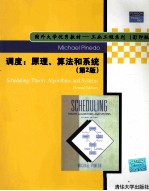图书介绍
调度 原理、算法和系统PDF|Epub|txt|kindle电子书版本网盘下载

- (美)平多(MICHAELPINEDO)著 著
- 出版社: 北京:清华大学出版社
- ISBN:7302120439
- 出版时间:2005
- 标注页数:586页
- 文件大小:98MB
- 文件页数:602页
- 主题词:
PDF下载
下载说明
调度 原理、算法和系统PDF格式电子书版下载
下载的文件为RAR压缩包。需要使用解压软件进行解压得到PDF格式图书。建议使用BT下载工具Free Download Manager进行下载,简称FDM(免费,没有广告,支持多平台)。本站资源全部打包为BT种子。所以需要使用专业的BT下载软件进行下载。如BitComet qBittorrent uTorrent等BT下载工具。迅雷目前由于本站不是热门资源。不推荐使用!后期资源热门了。安装了迅雷也可以迅雷进行下载!
(文件页数 要大于 标注页数,上中下等多册电子书除外)
注意:本站所有压缩包均有解压码: 点击下载压缩包解压工具
图书目录
1 INTRODUCTION1
1.1 The Role of Scheduling1
1.2 The Scheduling Function in an Enterprise4
1.3 Outline of the Book6
Part 1 Deterministic Models11
2 DETERMINISTIC MODELS:PRELIMINARIES13
2.1 Framework and Notation14
2.2 Examples20
2.3 Classes of Schedules21
2.4 Complexity Hierarchy26
3 SINGLE MACHINE MODELS(DETERMINISTIC)33
3.1 The Total Weighted Completion Time34
3.2 The Maximum Lateness40
3.3 The Number of Tardy Jobs46
3.4 The Total Tardiness49
3.5 The Total Weighted Tardiness53
3.6 Discussion57
4 MORE ADVANCED SINGLE MACHINE MODELS(DETERMINISTIC)62
4.1 The Total Tardiness:An Approximation Scheme63
4.2 The Total Earliness and Tardiness66
4.3 Primary and Secondary Objectives74
4.4 Multiple Objectives:A Parametric Analysis76
4.5 The Makespan with Sequence-Dependent Setup Times79
4.6 Discussion88
5 PARALLEL MACHINE MODELS(DETERMINISTIC)93
5.1 The Makespan without Preemptions94
5.2 The Makespan with Preemptions105
5.3 The Total Completion Time without Preemptions112
5.4 The Total Completion Time with Preemptions116
5.5 Due Date-Related Objectives119
5.6 Discussion121
6 FLOW SHOPS AND FLEXIBLE FLOW SHOPS(DETERMINISTIC)129
6.1 Flow Shops with Unlimited Intermediate Storage130
6.2 Flow Shops with Limited Intermediate Storage142
6.3 Flexible Flow Shops with Unlimited Intermediate Storage150
7 JOB SHOPS(DETERMINISTIC)156
7.1 Disjunctive Programming and Branch and Bound157
7.2 The Shifting Bottleneck Heuristic and the Makespan167
7.3 The Shifting Bottleneck Heuristic and the Total Weighted Tardiness174
7.4 Discussion181
8 OPEN SHOPS(DETERMINISTIC)186
8.1 The Makespan without Preemptions187
8.2 The Makespan with Preemptions191
8.3 The Maximum Lateness without Preemptions193
8.4 The Maximum Lateness with Preemptions198
8.5 The Number of Tardy Jobs203
8.6 Discussion204
Part 2 Stochastic Models209
9 STOCHASTIC MODELS:PRELIMINARIES211
9.1 Framework and Notation212
9.2 Distributions and Classes of Distributions212
9.3 Stochastic Dominance217
9.4 Impact of Randomness on Fixed Schedules220
9.5 Classes of Policies223
10 SINGLE MACHINE MODELS(STOCHASTIC)231
10.1 Arbitrary Distributions without Preemptions231
10.2 Arbitrary Distributions with Preemptions:The Gittins Index238
10.3 Likelihood Ratio Ordered Distributions243
10.4 Exponential Distributions247
11 SINGLE MACHINE MODELS WITH RELEASE DATES(STOCHASTIC)258
11.1 Arbitrary Releases and Arbitrary Processing Times259
11.2 Priority Queues,Work Conservation,and Poisson Releases261
11.3 Arbitrary Releases and Exponential Processing Times266
11.4 Poisson Releases and Arbitrary Processing Times272
11.5 Discussion278
12 PARALLEL MACHINE MODELS(STOCHASTIC)283
12.1 The Makespan without Preemptions284
12.2 The Makespan and Total Completion Time with Preemptions293
12.3 Due Date-Related Objectives302
13 FLOW SHOPS,JOB SHOPS,AND OPEN SHOPS(STOCHASTIC)308
13.1 Stochastic Flow Shops with Unlimited Intermediate Storage309
13.2 Stochastic Flow Shops with Blocking316
13.3 Stochastic Job Shops321
13.4 Stochastic Open Shops322
Part 3 Scheduling in Practice333
14 GENERAL PURPOSE PROCEDURES FOR SCHEDULING IN PRACTICE335
14.1 Dispatching Rules336
14.2 Composite Dispatching Rules338
14.3 Filtered Beam Search342
14.4 Local Search:Simulated Annealing and Tabu-Search345
14.5 Local Search:Genetic Algorithms352
14.6 Discussion353
15 MORE ADVANCED GENERAL PURPOSE PROCEDURES359
15.1 Decomposition Methods and Rolling Horizon Procedures360
15.2 Constraint Guided Heuristic Search364
15.3 Market-Based and Agent-Based Procedures373
15.4 Procedures for Scheduling Problems with Multiple Objectives380
15.5 Discussion386
16 MODELING AND SOLVING SCHEDULING PROBLEMS IN PRACTICE391
16.1 Scheduling Problems in Practice392
16.2 Cyclic Scheduling of a Flow Line396
16.3 Flexible Flow Line with Limited Buffers and Bypass401
16.4 Flexible Flow Line with Unlimited Buffers and Setups407
16.5 Bank of Parallel Machines with Release Dates and Due Dates413
16.6 Discussion414
17 DESIGN,DEVELOPMENT,AND IMPLEMENTATION OF SCHEDULING SYSTEMS419
17.1 Systems Architecture420
17.2 Databases and Knowledge-Bases421
17.3 Schedule Generation Issues426
17.4 User Interfaces and Interactive Optimization429
17.5 Generic Systems Versus Application-Specific Systems435
17.6 Implementation and Maintenance Issues438
18 ADVANCED CONCEPTS IN SCHEDULING SYSTEM DESIGN444
18.1 Robustness and Reactive Scheduling445
18.2 Machine Learning Mechanisms450
18.3 Design of Scheduling Engines and Algorithm Libraries455
18.4 Reconfigurable Systems459
18.5 Scheduling Systems on the Internet461
18.6 Discussion464
19 EXAMPLES OF SYSTEM DESIGNS AND IMPLEMENTATIONS468
19.1 The SAP-APO System469
19.2 IBM's Independent Agents Architecture472
19.3 i2's TradeMatrix Production Scheduler476
19.4 An Implementation of Cybertec's Cyberplan483
19.5 Synquest's Virtual Production Engine488
19.6 The LEKIN System for Research and Teaching493
19.7 Discussion500
20 WHAT LIES AHEAD?502
20.1 Theoretical Research503
20.2 Applied Research505
20.3 Systems Development and Integration507
APPENDIXES511
A MATHEMATICAL PROGRAMMING:FORMULATIONS AND APPLICATIONS513
A.1 Linear Programming Formulations513
A.2 Integer Programming Formulations518
A.3 Disjunctive Programming Formulations522
B DETERMINISTIC AND STOCHASTIC DYNAMIC PROGRAMMING525
B.1 Deterministic Dynamic Programming525
B.2 Stochastic Dynamic Programming529
C COMPLEXITY THEORY533
C.1 Preliminaries533
C.2 Polynomial Time Solutions Versus NP-Hardness536
C.3 Examples539
D COMPLEXITY CLASSIFICATION OF DETERMINISTIC SCHEDULING PROBLEMS543
E OVERVIEW OF STOCHASTIC SCHEDULING PROBLEMS547
F SELECTED SCHEDULING SYSTEMS551
REFERENCES555
NAME INDEX577
SUBJECT INDEX582